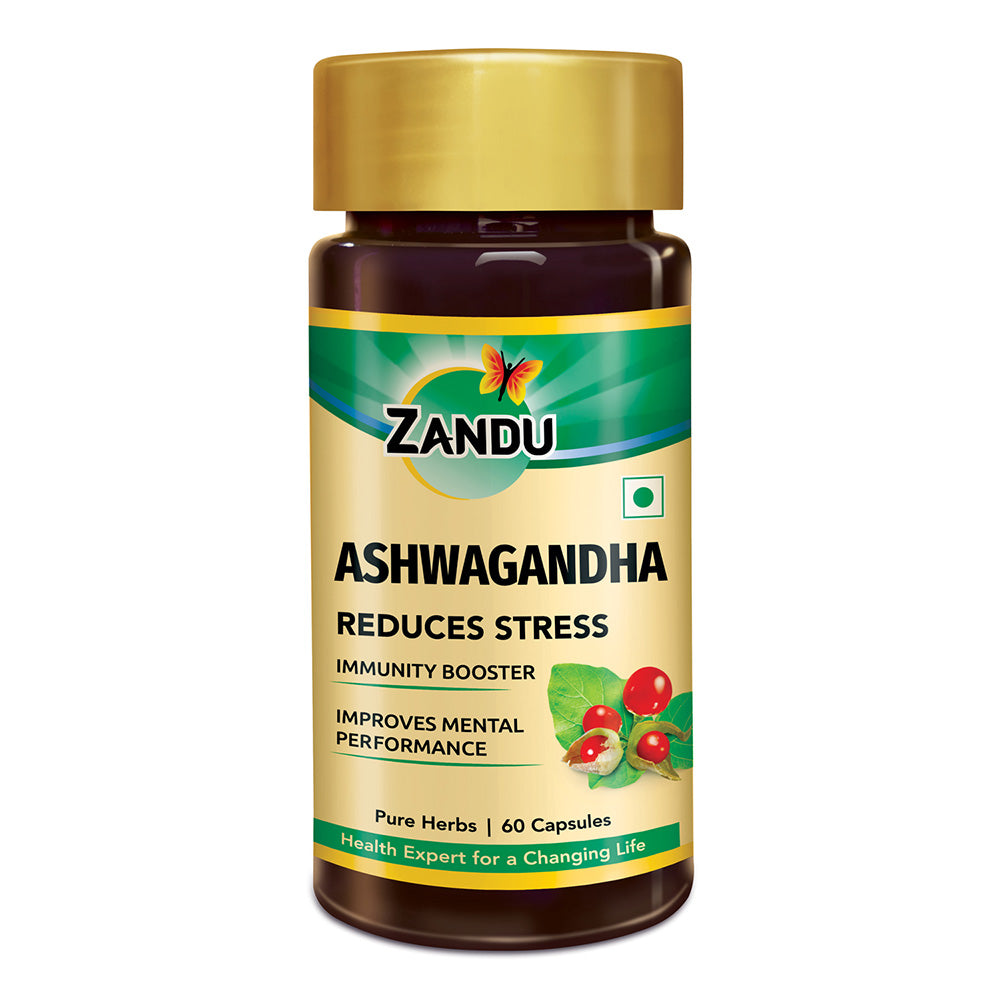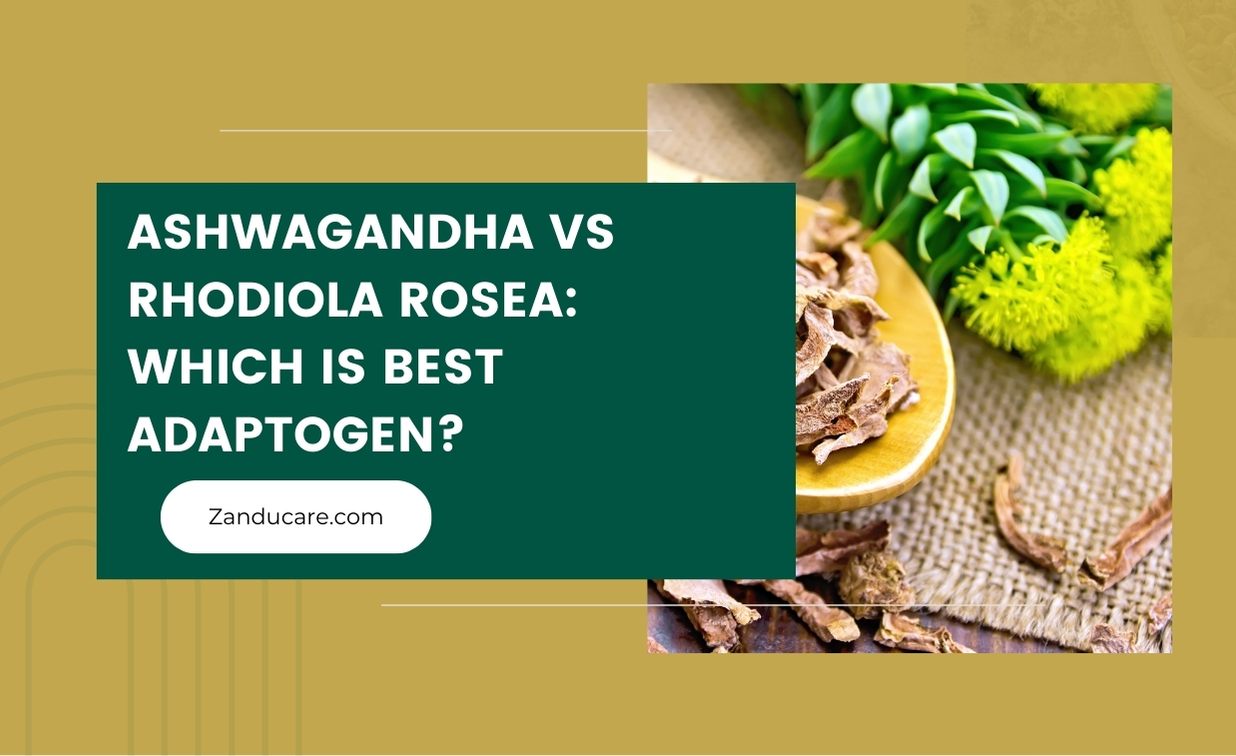
Reduces Stress & Cortisol, Improves Sleep and Muscle Recovery, with over 5% Withanolide Content | Scientifically Tested

Reduces Stress & Anxiety | 100% Natural Active | Root Extract | Improves Mental Performance | Scientifically Proven


Key insights:
Ashwagandha and Rhodiola rosea are two of the most popular adaptogenic herbs in herbal medicine. Both have been used for centuries to help the body adapt to stress, boost energy levels, and promote overall well-being. But how exactly do these two herbs' medicinal properties and health benefits compare? This article provides an in-depth comparison of Ashwagandha and Rhodiola.
Did you know:

Ashwagandha and Rhodiola are two powerful adaptogen herbs used for thousands of years in traditional medicine. Ashwagandha, made from the roots of Withania somnifera, reduces stress, boosts energy, enhances focus, balances hormones and strengthens the immune system. Its active compounds, called withanolides, are responsible for these benefits.
Similarly, Rhodiola rosea root enhances energy, endurance, brain function, and concentration while alleviating depression and anxiety. Its adaptogenic effects come from rosavin and salidroside. In summary, both herbs stimulate resilience against physical and mental fatigue while calming the nervous system, but they work in unique ways to optimise health and performance. The two can complement each other quite well when combined.
|
Nutrient/Compound |
Rhodiola Rosea (per 100g) |
Ashwagandha (per 100g) |
|
Energy |
Not Specified |
245 Kcal |
|
Carbohydrate |
~4% - 5% |
49.9 g |
|
Dietary Fiber |
~0.3% - 0.5% |
32.3 g |
|
Protein |
~1% |
3.9 g |
|
Iron |
Not Specified |
3.3 mg |
|
Calcium |
Not Specified |
23 mg |
|
Vitamin C |
Not Specified |
3.7 mg |
|
Rosavins (Rosavin, Rosarin, Rosin) |
3% - 4% |
Not Present |
|
Salidroside |
1% - 1.5% |
Not Present |
|
Tyrosol |
~0.1% |
Not Present |
|
Flavonoids |
0.5% - 1% |
Not Present |
|
Phenolic Acids (e.g., chlorogenic acid) |
~0.2% |
Not Present |
|
Organic Acids (e.g., citric acid) |
~0.1% |
Not Present |
|
Essential Oils |
0.05% - 0.1% |
Not Present |
|
Ash (Minerals) |
~1% |
Not Specified |
|
Moisture Content |
~10% |
Not Specified |
|
Aspect |
Ashwagandha |
Rhodiola Rosea |
|
Botanical Name |
Withania somnifera |
Rhodiola Rosea |
|
Common Name |
Indian Ginseng, Winter Cherry |
Golden Root, Arctic Root |
|
Plant Family |
Solanaceae |
Crassulaceae |
|
Native Region |
India, Middle East, and North Africa |
Cold regions of Asia and Europe |
|
Primary Uses |
Reducing stress, enhancing sleep, boosting immunity |
Increasing energy, reducing fatigue, and improving focus |
|
Active Compounds |
Withanolides |
Rosavins and Salidrosides |
|
Energy Boost |
Gentle mainly works by calming the nervous system |
It provides an instant energy boost by enhancing endurance |
|
Stress Relief |
Reduces cortisol and helps balance mood over time |
Helps manage physical and mental fatigue quickly |
|
Cognitive Benefits |
It helps with memory and overall brain health |
Enhances focus and mental clarity |
|
Best Taken For |
Chronic stress, anxiety, overall health support |
Immediate boost in energy, focus, and physical performance |
|
Side Effects |
Generally safe; can cause stomach upset if overdosed |
Usually mild, but can cause dizziness or dry mouth in some people |
|
Usage Duration |
Long-term for best results |
Short-term for quick effects |
|
Adaptogenic Strength |
Strong adaptogen, often used for long-term balance |
Known for quick, energy |
Below are the health benefits of Ashwagandha and Rhodiola Rosea:
Here are the advantages of Ashwagandha:

Ashwagandha is well known for its ability to reduce stress and anxiety. Research demonstrates how well it works to reduce cortisol levels, a hormone associated with stress. You can successfully lessen the harmful effects of chronic stress by incorporating Ashwagandha into your daily routine in addition to yoga, meditation, and getting enough sleep.
Ashwagandha is very good at reducing stress. Many studies show it specifically helps lower levels of the stress hormone cortisol. Taking Ashwagandha regularly can help control chronic stress and related health problems like anxiety, high blood pressure, ageing, and arthritis.
Combining Ashwagandha supplementation with stress-relieving activities such as yoga, meditation, and getting enough sleep may provide even more anti-stress benefits. Ashwagandha counters oxidative damage from stress, which prevents associated diseases.

High stress often disrupts sleep quantity and quality. Ashwagandha may help with sleep problems even for people experiencing long-term stress. A study published in Cureus followed 58 people with chronic stress and sleep issues.
One group took 300mg of Ashwagandha root extract twice daily, while another took a placebo. After 5 and 10 weeks, those taking ashwagandha reported better sleep than the placebo group.
Ashwagandha can help increase testosterone levels and improve fertility in men. A study by the University of Medical Sciences, Tabriz, Iran found this after an experiment. Men given Ashwagandha root extract saw improved sperm health and lower infertility rates. Exactly how ashwagandha enhances sperm quality is not fully understood.
However, the herb's high antioxidant content likely supports reproductive health. Overall, adding Ashwagandha may support healthy testosterone and fertility, especially for men looking to boost reproductive function. More research on women is still needed, but initial findings are promising for female fertility as well.
Ashwagandha enhances memory and cognitive abilities. Brain nerve cells are protected by their anti-inflammatory and antioxidant properties. As a result, it is an essential supplement for preserving memory, concentration, and mental clarity. Research has shown that regular ashwagandha consumption improves cognitive function, memory, and focus.
Below are the health benefits of Rhodiola Rosea:
Rhodiola is well-known as an adaptogen herb that increases the body's ability to handle stress. Research shows it can also relieve symptoms of burnout caused by prolonged stress. A 12-week study of 118 people with stress-related burnout found that taking 400mg of Rhodiola daily significantly improved associated symptoms like anxiety, fatigue, and depression.
The greatest benefits were noticed in the first week but continued throughout the study. While more research is still needed, this initial study shows promise for rhodiola as an effective treatment for the effects of chronic stress and burnout.

For decades, Rhodiola has been used by athletes and soldiers alike because it enhances physical performance. It's the best performance enhancer without the use of drugs.
Rhodiola is a fantastic vitamin for anyone new to exercising and needs a little additional motivation to get through their intense exercises because it makes exercise feel less taxing.
Factors like stress, anxiety, and poor sleep often cause feelings of mental and physical tiredness. The adaptogenic properties of rhodiola may help relieve fatigue. A study gave 100 people with chronic fatigue 400mg of rhodiola daily for 8 weeks. After just 1 week, significant improvements were seen in stress levels, fatigue, mood, concentration, and quality of life.
These continued improving throughout the entire 8 weeks. Rhodiola's anti-fatigue effects work by helping the body adapt to and counter the exhaustion-promoting effects of stress and sleep deprivation.
Adaptogens are valuable for mental health as they support a balanced brain and stable neurotransmitter levels, a role often fulfilled by antidepressant medications. Clinical trials have shown that adaptogens can reduce symptoms of depression and insomnia. Participants who took higher doses also reported a boost in self-esteem.

Rhodiola also improves concentration and mental vigour. Clinical research indicates that it enhances mood support and self-esteem while assisting with depression and insomnia. People with chronic fatigue syndrome benefit most from it, as it lessens both physical and mental fatigue.
When mixing Rhodiola and Ashwagandha, following the correct dosages is essential. Aim for 600 milligrams of Ashwagandha daily, divided into two doses of 300 mg each. The best times to take these doses are in the morning and evening. There should be no more than 680 mg of Rhodiola each day and no more than 200 mg in a single dose.
As you observe your body's reaction, start with the lower dosage range and make adjustments as necessary. Consistency is essential since it may take weeks or months for the full effects of the herbs to manifest.
Do check our 100% Ayurvedic and pure Ashwagandha Products:
Below are some of the side-effects of Ashwagandha and Rhodiola Rosea, which help you to know what precautions to take while ingesting both:
Ashwagandha is typically safe in small or moderate doses, but some side effects can occur, including:
Research has shown that Rhodiola is generally considered safe and well-tolerated. However, some side effects can occur:
Ashwagandha and Rhodiola Rosea are two of the most widely used adaptogenic herbs, each with unique benefits and applications in supporting health and well-being. While both help the body manage stress, Ashwagandha is known for its calming effects, hormone balancing, and long-term stress reduction.
On the other hand, Rhodiola Rosea is effective for quick energy boosts, enhancing focus, and combating fatigue, making it ideal for short-term physical and mental endurance. Both herbs complement each other well, offering a powerful combination of resilience against physical and mental stress. When choosing between the two, consider your specific health goals and consult a healthcare professional to ensure safe and effective use.
Do check our other Ashwagandha guide:
Yes, Ashwagandha and Rhodiola rosea can be taken together as they have complementary effects. Ashwagandha provides long-term stress relief and hormone balancing, while Rhodiola offers quick energy and mental clarity. However, consult a healthcare provider to determine the correct dosage.
Ashwagandha is often recommended for chronic stress as it reduces cortisol over time. Rhodiola may be better for immediate stress relief, especially for those facing physical or mental fatigue.
Both are generally safe in moderate doses. Ashwagandha may cause stomach upset, and pregnant or breastfeeding women should avoid it. Rhodiola can cause mild side effects like dry mouth or dizziness. Always start with a low dose and consult a doctor if you have any concerns.
Ashwagandha improves sleep quality, particularly for those with stress-related sleep issues. Rhodiola is not primarily used for sleep but can help reduce fatigue, indirectly supporting better rest.
People who are pregnant, breastfeeding, or have serious health conditions should avoid using these herbs without medical advice. Rhodiola and Ashwagandha may also interact with certain medications, so consult a healthcare provider if you are taking any prescriptions.

Reduces Stress & Cortisol, Improves Sleep and Muscle Recovery, with over 5% Withanolide Content | Scientifically Tested

Reduces Stress & Anxiety | 100% Natural Active | Root Extract | Improves Mental Performance | Scientifically Proven
Leave a comment
This site is protected by hCaptcha and the hCaptcha Privacy Policy and Terms of Service apply.